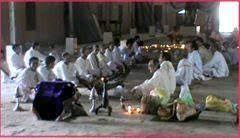Detailed Narrative
Meaning and Importance:
In Assamese, "Paal" means "turn" or "batch" and "Naam" refers to "devotional prayer or hymn." Paal Naam is performed by groups of devotees who take turns (in 'paals') to keep the prayer and chanting going continuously for long hours — often overnight or across several days during festivals and religious observances.
This tradition symbolizes community bonding, devotion, spiritual discipline, and a collective celebration of faith. Paal Naam events often take place during special occasions like Naam Kirtan Mahotsav, Janmashtami, and Raas Mahotsav across different Namghars in Assam.
Quick Fact:
The soothing melodies, rhythmic khol (drum) beats, taal (cymbals), and the spiritual verses create a divine atmosphere during Paal Naam, drawing participants and listeners into a serene devotional experience.
